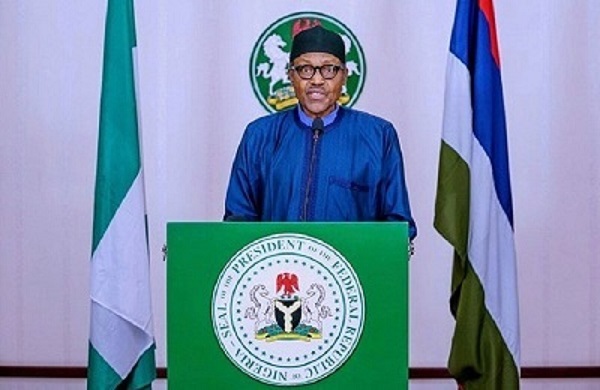President Mohammadu Buhari
-By Felix Douglas
…World’s energy mix in 2040 will still come from hydrocarbons
…Hydrocarbon industry remains a multi-trillion-dollar industry in decades.
…Oil industry needs to drive down cost per barrel before it is exterminated by fallen prices.
Giving his opening address at the 4th Edition of Nigeria International Petroleum Summit (NIPS), the President of Nigeria, Muhammadu Buhari, recalled that some of the participants who gathered for the Decade of Gas Conference eventually served as a prelude to the conference.
The President said the highly successful pre-summit event created momentum for NIPS.
Buhari revealed that over the past three editions, the summit has grown both in stature and relevance that it has become a veritable platform for Nigeria and Africa to engage the local investment communities as well as directly market her oil and gas sector as credible business investment destination to a global audience.
He said the present administration has demonstrated an unparalleled commitment to the overhauling of the oil and gas industry in Nigeria. The ambitious goal of ramping up crude oil production to at least 4 million barrels per day and building a reserve of 40 billion barrels remains sacrosanct and guiding principle to the country’s overall outlook for the industry.
The President posited that creating conducive business environment for hydrocarbon industry to thrive is no longer a choice but a necessity.
President Buhari commented on the topic of the summit: “From crisis to opportunities: New approaches to the future of hydrocarbons” that crisis is often an opportunity to re-define objectives and provides pathway for re-discovery.
“The crisis the oil and gas industry are facing today was necessitated by the COVID-19 pandemic. It accelerated an unprecedented demand disruption and a supply glut that generated the crisis for the global economy and the oil industry particular.”
He said addressing the crisis has presented both challenges and opportunities. The immediate challenge is that the global agenda for energy transition has taken the back seat. Governments across the world are now more focused on managing the COVID-19 pandemic and its impact on economies than the quest for energy transition. This has led to gradual realization that the transition to 100% renewable energy may not happen soon.
However, energy transition is real. Renewable technologies are getting cheaper and investors are increasingly conscious of environmental issues and are beginning to turn their back on hydrocarbon investments.
According to the President, history has shown that human beings have insatiable appetite for energy which renewables does not have the capacity to cope with in the foreseeable future.
Experts projected that about 80 percent of the world’s energy mix in 2040 will still come from hydrocarbons. Fossil fuels will continue to be the source of dozens of petrochemicals feedstocks that companies transform into versatile and valued materials for modern life.
Thus, the hydrocarbon industry will remain a multi-trillion-dollar industry in the coming decades.
Nigeria, with a vast hydrocarbon potential, this is an opportunity. How the country will exploit that opportunity is a matter of strategy. Therefore, to develop the strategy is at heart of the core objective which birth the establishment of the summit in 2016.
Buhari said the fundamental outcome expected from the summit should be the strategies and new approaches to the future of hydrocarbon resources and how to return to the attractive industry performance pre-pandemic era.
In this regard, lower cost is critical. Cost is the energy future. The industry needs to drive down its cost per barrel before it is exterminated by prices falling below production costs, a phenomenon witnessed at the outset of the pandemic.
It is obvious that 80-percent of the global energy mix by 2040 will still be hydrocarbon. Discovery of new fields is crucial with the need to address short-term opportunities using existing technology that can extend the life of mature oil fields.
This necessitated government’s commitment to issue new marginal fields licenses recently.
The President commended Ministry of Petroleum Resources, Nigeria National Petroleum Corporation (NNPC), Department of Petroleum Resources (DPR) and other relevant MDAs for their steadfastness and helping the administration build a robust hydrocarbon industry.
Buhari applauded the International Oil Companies (IOC), indigenous oil companies and financial institutions for their role in keeping the industry alive despite challenges posed by Covid-19 pandemic.


Comment here